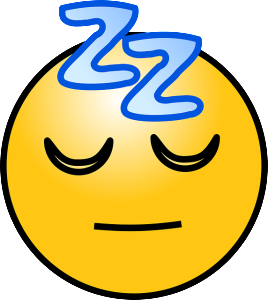Sleep!
 As a holistic practitioner, I am always looking for ways to improve my patients’ mental health without the use of psychiatric medications. Most often I find that my patients are not getting enough sleep. How much is enough you might ask? Ask anyone how much sleep the population needs and they’ll invariably answer: 8 hours. Ask them how much they themselves need and you’ll often hear: 6 to 7 hours. Why the disparity? If we all know that people need 8 hours of sleep, how come we don’t get it? Most of my patients believe that the need for 8 hours of sleep is an old wives tale. Perhaps some of the current thinking has to do with military studies in the 1950s showing that soldiers only needed 4 hours of sleep. That may have been true as an absolute minimum; but how many hours do we need to function at our full potential?
As a holistic practitioner, I am always looking for ways to improve my patients’ mental health without the use of psychiatric medications. Most often I find that my patients are not getting enough sleep. How much is enough you might ask? Ask anyone how much sleep the population needs and they’ll invariably answer: 8 hours. Ask them how much they themselves need and you’ll often hear: 6 to 7 hours. Why the disparity? If we all know that people need 8 hours of sleep, how come we don’t get it? Most of my patients believe that the need for 8 hours of sleep is an old wives tale. Perhaps some of the current thinking has to do with military studies in the 1950s showing that soldiers only needed 4 hours of sleep. That may have been true as an absolute minimum; but how many hours do we need to function at our full potential?
A study by David Dinges and colleagues at the University of Pennsylvania School of Medicine in 2003 added support to the old wives tale. They tested patients to see their baseline mental functioning and then randomly assigned them to no sleep for 72 hours, or 8+, 6, or 4 hours of sleep per night for 2 weeks. At the end of the 2-week period the patients were tested again. The patients who consistently got less than 8 hours of sleep performed worse on the test than at baseline (even if they didn’t feel tired). Patients who got 8 or more hours of sleep performed the same or better. The conclusion was that the average person needs 8.16 hours of sleep (8 hours and 10 minutes). So maybe those old wives were right?
The bottom line in my practice is this: patients who routinely get less than 8 hours sleep and who experience low mood, anxiety, agitation, low libido, disorganization, and/or memory issues all show improvement after increasing their sleep to 8+ hours.
And for those of my patients who have difficulty falling asleep or staying asleep, my first recommendation is for them to adopt a healthy routine of sleep hygiene. Sleep hygiene is the proper care of your sleeping habits — just like dental hygiene and physical hygiene are the proper care of your teeth and body. A great list of sleep hygiene tips can be found on the Sleep Hygiene page of the AASM. In addition to the great suggestions on the AASM page, my patients have benefited from using an alarm clock every night (including late morning on weekends) and by keeping an “action pad” next to their bed — an action pad is a place to temporarily put your worries until morning. Medication then remains as an alternative for my patients who need it.
For more information, I recommend the AASM website: Sleep Education. [Disclosure: I have no affiliation with the AASM]
Pleasant dreams!
Pingback: Sleep! UPDATE » Blog